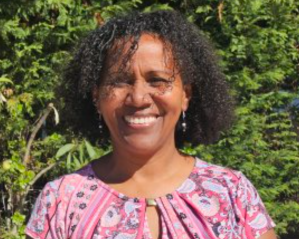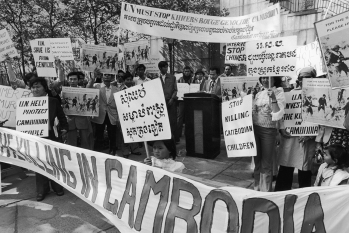
The rapid growth and vibrant pulse of the African church is often powered by the unwavering faith and tireless commitment of women, sometimes constituting up to 90% of congregants in some churches. Yet, this numerical strength often stands in stark contrast to their representation in leadership, a reality that Dr. Seble Daniel grapples with in her role as the executive director for the Women's Commission at the World Evangelical Alliance.
Seble acknowledges that the challenges faced by women in Africa are deeply ingrained in societal norms and often inadvertently perpetuated within the church, where in an African context, the line between culture and Scripture is often blurred.
"Sometimes there is this temptation of using the Scriptures to normalize oppression of women and weaponizing the Scriptures. It's very painful when the Bible is used to silence women," Seble said in an interview with Christian Daily International on the sidelines of the International Council for Evangelical Theological Education (ICETE) conference in Tirana, Albania.
She traced the history of the gender roles from the earliest years where women were socialized into specific roles. "So we are really prepared to serve others in different roles but not in teaching, preaching and leading. Those kinds of public ministries are usually reserved for men, but from childhood we're kind of prepared to be a good wife, a good mother, caretaker of the family, nurturer. That's the kind of work people want us to have," she said.
With a background deeply rooted in advocating for girls and women and tackling harmful traditional practices in Ethiopia, such as Female Genital Mutilation (FGM), Seble's perspective offers a crucial lens through which to understand the multifaceted experiences of African women in the Church.
"It's true," she acknowledges, "Women are the majority in churches. Sometimes we're told we don't belong here. In many ways, especially women who are in leadership in different institutions, are questioned, interrogated. So it is not easy. It has never been easy."
This deeply ingrained socialisation can lead to self-abnegation, where women themselves might internalise these limitations and hesitate to step into leadership roles or fully utilise their God-given gifts.
For those who do recognise a calling to ministry and seek theological training, women face hurdles on raising tuition fee, overcoming entrenched perceptions on women ministers and deployment after Bible college.
Seble emphasises the need for the church to recognise the gifts of women and provide them with space to serve and even to make mistakes, just as their male counterparts do.
At the heart of these challenges lies the complex interplay between culture, tradition, and biblical interpretation. Seble stresses the critical importance of "sifting through what is coming from our culture and tradition and what has come from the Scriptures. Sometimes we confuse the two."
However, Seble points out that Scripture has powerful examples of God's view of women and Jesus' inclusive ministry offers a beacon of hope. Jesus' interactions with women were revolutionary for his time.
"When we see how Jesus treated women, how he was not ashamed to be followed by them, can you imagine? He's a Jewish rabbi. There were some Jews around that time who used to say it's better to burn the Torah than to teach it to women. Jesus empowered those who were marginalized, ushering in a kingdom for all who put their trust in him."
Furthermore, the Holy Spirit distributes gifts as He desires, bestowing gifts of teaching, advocacy, and leadership on both women and men. "So he gave me the gift of teaching, what should I do with it?" asks Seble, who also serves on the faculty of the Ethiopian Graduate School of Theology. The Church is called to make way for all to exercise their gifts for the edification of the body.
In navigating this complex landscape, the role of men in empowering women is paramount.
Seble believes that men, often holding positions of influence within both society and the church, have a crucial choice to make. "Men can choose how to use their voice and their influence. It's a choice. Jesus chose to serve. Jesus chose to come down, and Jesus chose to uplift the weak and marginalized."
Recognizing the societal advantages men often possess, she urged them to use their voice to open doors for women.
"My message to men is that they use their masculinity to protect women and not abuse them. They are to be intentional about preventing abuse of all kinds and holding perpetrators accountable when abuse takes place."
Seble also encouraged young women embarking on their journey of faith and service within the African Church to look for support and mentorship from "voices of affirmation" and to constantly remind themselves that it is God who has called them to service hence the need to be faithful.
"Whatever spirit of influence the Lord has given us, let's use our gift faithfully. Let's be faithful to what is entrusted to us." She added that each generation contributes to a better future for those who have persevered through a deep conviction in a divine calling.
Despite the ongoing challenges, Seble sees encouraging signs of positive change within the African Church. In the mission world, she notes a significant shift where women with leadership gifts are increasingly being appointed to leadership positions, a departure from past practices where even pioneering female missionaries were often overlooked for leadership roles.
Theological education institutions are also becoming more open to women as faculty members, deans, and even presidents of seminaries.
Within her own denomination, the Ethiopian Kale Heywet Church, women are now participating in leadership at the local church level, serving as representatives of women's departments on elders' boards. Seble views this not just as an opening for women, but as "opening for the body to edify and to be edified... opening for the spirit to minister to us through women, through young people."
"My vision for the Church is that everybody would serve according to their gift. And they would not be made to feel inferior because of who they are, because of what they are born with. That's my vision. The Church would be home for everybody, where people would be safe," she said.





